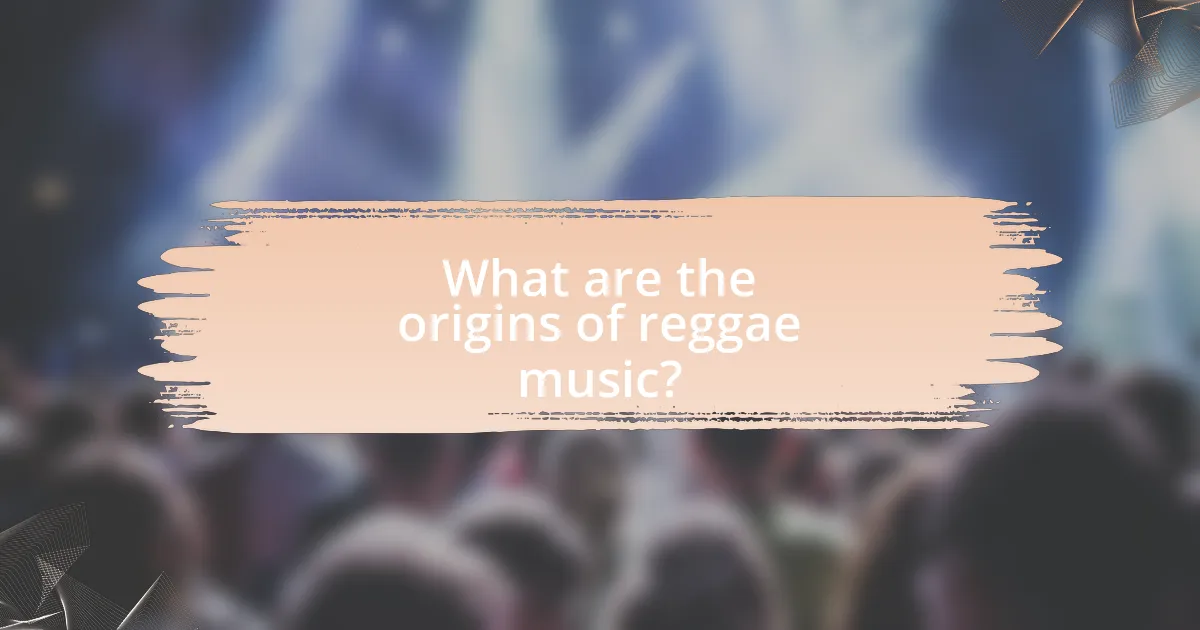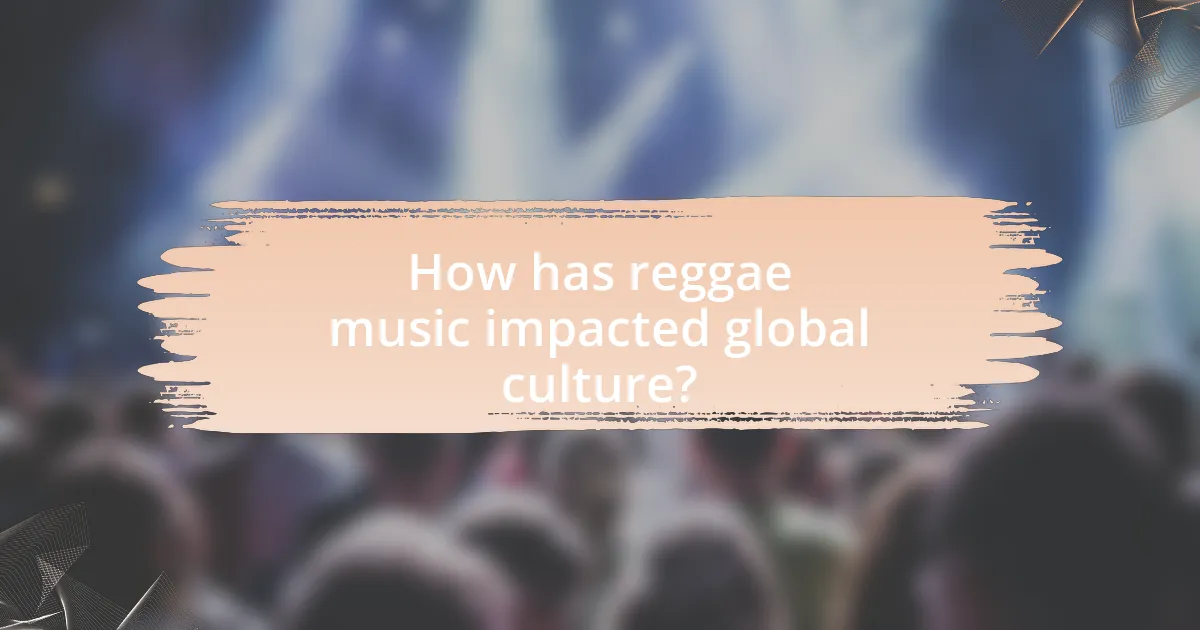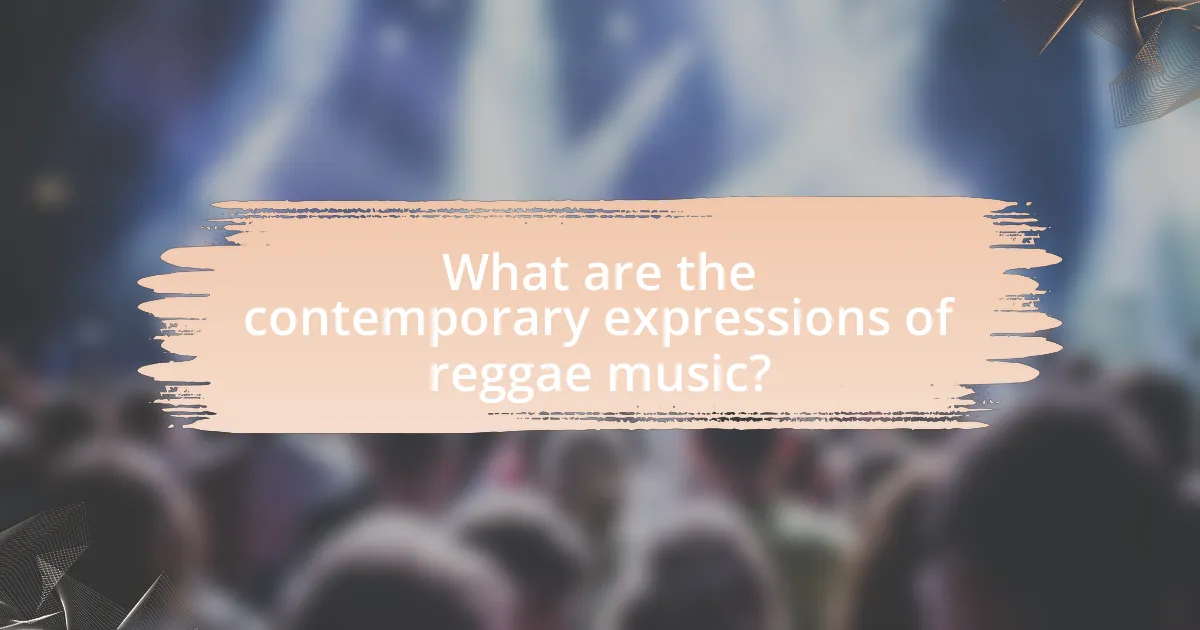The article “Understanding the Roots of Reggae: A Journey Through Its Cultural Significance” explores the origins and evolution of reggae music, which emerged in Jamaica in the late 1960s from ska and rocksteady. It highlights the genre’s distinctive rhythm, socio-political themes, and the influence of Rastafarian culture on its lyrical content. The article also examines how reggae has impacted global culture, addressing social justice and unity, while discussing contemporary expressions and challenges faced by the genre in the modern music industry. Key artists, subgenres, and the ongoing efforts to preserve reggae’s cultural roots are also covered, providing a comprehensive overview of reggae’s significance and relevance today.

What are the origins of reggae music?
Reggae music originated in Jamaica in the late 1960s, evolving from earlier genres such as ska and rocksteady. The genre is characterized by its distinctive rhythm, which emphasizes the offbeat, and its themes often reflect social and political issues, influenced by Rastafarian culture. The first reggae song to gain international recognition was “No Woman, No Cry” by Bob Marley, which helped to popularize the genre globally.
How did reggae evolve from earlier musical styles?
Reggae evolved from earlier musical styles such as ska and rocksteady, which were prominent in Jamaica during the 1960s. Ska, characterized by its upbeat tempo and offbeat guitar rhythms, laid the foundation for reggae’s slower tempo and more pronounced bass lines. As ska transitioned into rocksteady, the music became more relaxed, emphasizing the rhythm section and allowing for deeper lyrical content. This evolution culminated in reggae, which incorporated elements of Rastafarian culture, social commentary, and a distinctive offbeat guitar strum known as the “one drop” rhythm. The emergence of reggae was further influenced by American jazz and rhythm and blues, which contributed to its melodic and harmonic structures.
What influences shaped the sound of reggae in its early days?
The sound of reggae in its early days was shaped primarily by ska and rocksteady music, along with influences from African rhythms and American jazz and rhythm and blues. Ska, which emerged in Jamaica in the late 1950s, featured a fast tempo and offbeat guitar strumming, while rocksteady slowed the tempo and emphasized the bass line, laying the groundwork for reggae’s distinctive sound. Additionally, the cultural context of Rastafarianism contributed to reggae’s lyrical themes and spiritual depth, reflecting social and political issues in Jamaica during the 1960s. These elements combined to create a unique musical genre that resonated with the Jamaican populace and later gained international recognition.
How did socio-political factors contribute to the development of reggae?
Socio-political factors significantly contributed to the development of reggae by reflecting the struggles and aspirations of marginalized communities in Jamaica. The genre emerged in the late 1960s during a period marked by political unrest, economic hardship, and social inequality, particularly affecting the working-class population. The rise of Rastafarianism, which emphasized themes of resistance against oppression and a return to African roots, further influenced reggae’s lyrical content and cultural identity. Additionally, the political climate, including the influence of leaders like Michael Manley, who promoted social justice and equality, provided a backdrop for reggae artists to express their views on issues such as poverty, violence, and colonialism. This context allowed reggae to serve as a voice for social change, making it not just a musical genre but also a powerful tool for political expression and cultural identity.
What role did Jamaican culture play in the formation of reggae?
Jamaican culture was fundamental in the formation of reggae, as it provided the social, political, and musical context from which the genre emerged. The influence of Rastafarianism, a religious and social movement originating in Jamaica, infused reggae with themes of resistance, spirituality, and identity, shaping its lyrical content and cultural significance. Additionally, the historical context of colonialism and the struggles for independence in Jamaica contributed to reggae’s development as a voice for the marginalized, reflecting the experiences and aspirations of the Jamaican people. The fusion of traditional African rhythms, ska, and rocksteady music styles further established reggae’s unique sound, making it a distinct representation of Jamaican cultural identity.
How did Rastafarian beliefs influence reggae music and its themes?
Rastafarian beliefs significantly influenced reggae music and its themes by embedding spiritual and social messages within the genre. Reggae often reflects the Rastafarian emphasis on the struggles against oppression, the importance of African heritage, and the promotion of peace and love. For instance, songs by artists like Bob Marley, who is a prominent figure in reggae, frequently address themes of social justice, unity, and the glorification of Jah (God), which are central to Rastafarian ideology. The incorporation of biblical references and the celebration of African culture in reggae lyrics further exemplify this influence, making the genre a powerful vehicle for expressing Rastafarian values and beliefs.
What cultural practices and traditions are reflected in reggae lyrics?
Reggae lyrics reflect cultural practices and traditions such as Rastafarianism, social justice, and the celebration of African heritage. Rastafarian themes are prevalent, emphasizing spirituality, resistance against oppression, and the importance of community. For instance, many reggae songs reference the use of marijuana as a sacrament, which is a significant aspect of Rastafarian rituals. Additionally, reggae often addresses social issues like poverty and inequality, highlighting the struggles faced by marginalized communities in Jamaica. This is evident in the works of artists like Bob Marley, whose lyrics advocate for peace and unity while drawing on African cultural motifs and historical experiences, reinforcing the genre’s deep connection to its cultural roots.

How has reggae music impacted global culture?
Reggae music has significantly impacted global culture by promoting messages of social justice, peace, and unity. Originating in Jamaica in the late 1960s, reggae has transcended geographical boundaries, influencing various music genres and inspiring movements worldwide. The genre’s most notable figure, Bob Marley, popularized reggae’s themes, leading to its integration into global consciousness, as evidenced by his songs like “One Love” and “Get Up, Stand Up,” which advocate for human rights and equality. Additionally, reggae festivals and events around the world, such as the Reggae Sumfest in Jamaica and the Rototom Sunsplash in Spain, showcase its enduring influence and foster cultural exchange, further embedding reggae’s ethos into diverse societies.
What are the key messages conveyed through reggae music?
Reggae music conveys key messages of social justice, resistance against oppression, and the importance of love and unity. These themes are rooted in the historical context of Jamaica, where reggae emerged as a response to political and social struggles, particularly during the 1960s and 1970s. Artists like Bob Marley used their music to address issues such as poverty, inequality, and human rights, exemplified in songs like “Get Up, Stand Up,” which calls for activism and empowerment. The genre also emphasizes spiritual themes, often drawing from Rastafarian beliefs, promoting messages of peace, hope, and a connection to a higher power.
How do reggae songs address social justice and equality?
Reggae songs address social justice and equality by highlighting issues such as poverty, oppression, and human rights. Artists like Bob Marley and Peter Tosh have used their music to advocate for the marginalized, often referencing historical injustices faced by the African diaspora. For instance, Marley’s song “Get Up, Stand Up” calls for resistance against oppression, while Tosh’s “Equal Rights” explicitly demands justice and equality for all people. These songs serve as powerful anthems that resonate with listeners, promoting awareness and encouraging activism against social injustices.
What role does reggae play in promoting peace and unity?
Reggae plays a significant role in promoting peace and unity by conveying messages of love, social justice, and resistance against oppression. The genre’s lyrics often address themes of harmony and collective strength, encouraging listeners to embrace solidarity and understanding among diverse communities. For instance, Bob Marley’s song “One Love” explicitly calls for unity among all people, emphasizing the importance of coming together regardless of differences. This message resonates globally, fostering a sense of community and shared purpose, which is crucial in conflict resolution and social cohesion. Additionally, reggae music has historically served as a voice for marginalized groups, advocating for their rights and promoting peaceful coexistence, thus reinforcing its role as a catalyst for peace and unity.
How has reggae influenced other music genres?
Reggae has significantly influenced various music genres, particularly through its distinctive rhythms and social themes. The incorporation of reggae’s offbeat guitar strumming and bass-heavy sound can be seen in genres like rock, hip-hop, and pop. For instance, artists such as The Police and Eric Clapton have integrated reggae elements into their music, with The Police’s “Roxanne” showcasing reggae’s influence on rock. Additionally, hip-hop artists like Cypress Hill and Sean Paul have adopted reggae’s rhythmic patterns and lyrical styles, further blending the genres. The global reach of reggae has also inspired the development of subgenres like dancehall and reggaeton, which maintain reggae’s foundational elements while introducing new cultural influences.
What are some notable genres that have been inspired by reggae?
Notable genres inspired by reggae include ska, rocksteady, dub, and dancehall. Ska emerged in Jamaica in the late 1950s, characterized by its upbeat tempo and offbeat guitar rhythms, serving as a precursor to reggae. Rocksteady followed in the mid-1960s, slowing down the tempo and focusing on vocal harmonies. Dub, which developed in the 1970s, emphasizes instrumental remixes and sound effects, showcasing reggae’s innovative production techniques. Dancehall, emerging in the late 1970s, incorporates digital instrumentation and faster rhythms, reflecting contemporary influences while maintaining reggae’s foundational elements. Each of these genres demonstrates reggae’s significant impact on the evolution of Caribbean and global music.
How have reggae artists collaborated with musicians from different genres?
Reggae artists have collaborated with musicians from various genres by blending their distinct sounds and styles, resulting in innovative musical fusions. For instance, Bob Marley worked with artists like Eric Clapton, whose cover of “I Shot the Sheriff” brought reggae to a wider rock audience. Additionally, collaborations such as Damian Marley and Nas’s album “Distant Relatives” showcase the integration of hip-hop and reggae, emphasizing shared themes of struggle and resilience. These partnerships not only expand reggae’s reach but also highlight its influence on global music trends, as seen in the incorporation of reggae elements in pop, rock, and hip-hop tracks.

What are the contemporary expressions of reggae music?
Contemporary expressions of reggae music include genres such as dancehall, reggae fusion, and roots reggae revival. Dancehall, characterized by its upbeat tempo and digital production, has gained global popularity since the 1980s, with artists like Sean Paul and Beenie Man leading the way. Reggae fusion blends reggae with other genres like hip-hop, rock, and pop, exemplified by artists such as Matisyahu and Major Lazer. The roots reggae revival, marked by a return to traditional reggae sounds and themes, is represented by artists like Protoje and Chronixx, who emphasize cultural and social messages in their music. These expressions reflect reggae’s adaptability and ongoing influence in contemporary music scenes worldwide.
How has reggae music evolved in the 21st century?
Reggae music has evolved in the 21st century through the incorporation of diverse musical influences, technological advancements, and a global reach that has expanded its audience. Artists like Protoje and Koffee have blended reggae with genres such as hip-hop and R&B, creating a fusion that appeals to younger listeners while maintaining reggae’s core themes of social justice and resistance. The rise of digital platforms has facilitated the distribution of reggae music worldwide, allowing for greater collaboration among artists from different cultures and backgrounds. Additionally, the resurgence of interest in roots reggae and dancehall has led to a revival of traditional sounds, evidenced by the success of albums like Protoje’s “A Matter of Time,” which topped charts and garnered international acclaim.
What new subgenres have emerged from traditional reggae?
New subgenres that have emerged from traditional reggae include dancehall, dub, and reggae fusion. Dancehall originated in the late 1970s and is characterized by its faster tempo and digital instrumentation, while dub focuses on remixing and sound manipulation, often emphasizing bass and rhythm. Reggae fusion blends reggae with other genres such as rock, hip-hop, and pop, reflecting the genre’s adaptability and global influence. These subgenres illustrate the evolution of reggae and its ability to incorporate diverse musical elements while maintaining its cultural roots.
How do modern reggae artists maintain the genre’s cultural significance?
Modern reggae artists maintain the genre’s cultural significance by infusing contemporary issues and traditional themes into their music. They address social justice, political struggles, and cultural identity, reflecting the genre’s origins in resistance and empowerment. For instance, artists like Protoje and Koffee incorporate modern lyrical narratives that resonate with today’s youth while honoring reggae’s roots in Rastafarian culture and Jamaican history. This blend of old and new ensures that reggae remains relevant and continues to inspire new generations, preserving its cultural legacy.
What challenges does reggae face in the modern music industry?
Reggae faces significant challenges in the modern music industry, primarily due to commercialization and cultural appropriation. The commercialization of reggae often leads to a dilution of its authentic message and roots, as mainstream music trends prioritize marketability over cultural significance. Additionally, cultural appropriation by artists outside the genre can undermine the original cultural context and message of reggae, leading to a loss of its identity. According to a study by the University of the West Indies, reggae artists report feeling marginalized in a music landscape dominated by pop and hip-hop, which further complicates their ability to reach audiences while maintaining their cultural integrity.
How do commercialization and globalization affect reggae’s authenticity?
Commercialization and globalization dilute reggae’s authenticity by prioritizing marketability over cultural roots. As reggae music gains international popularity, it often undergoes modifications to appeal to broader audiences, leading to a loss of its original messages and social commentary. For instance, the rise of reggae fusion genres incorporates elements from pop and hip-hop, which can overshadow the traditional themes of resistance and identity inherent in classic reggae. This shift is evidenced by the mainstream success of artists like Sean Paul and Shaggy, whose music, while popular, often strays from the genre’s foundational principles. Consequently, the commercialization of reggae can result in a commodified version that lacks the depth and cultural significance that characterized its origins.
What efforts are being made to preserve reggae’s cultural roots?
Efforts to preserve reggae’s cultural roots include the establishment of educational programs, the documentation of oral histories, and the promotion of reggae festivals that celebrate its heritage. Organizations like the Jamaica Reggae Industry Association (JaRIA) work to support artists and promote reggae music globally, ensuring that its historical significance is recognized. Additionally, UNESCO recognized reggae as an Intangible Cultural Heritage in 2018, highlighting its importance and encouraging initiatives that protect its cultural expressions. These combined efforts aim to maintain the authenticity and legacy of reggae music for future generations.
What can listeners learn from reggae music today?
Listeners can learn about social justice and resilience from reggae music today. Reggae often addresses themes of oppression, inequality, and the struggle for freedom, reflecting the historical context of Jamaica and the Rastafarian movement. For instance, songs by Bob Marley, such as “Get Up, Stand Up,” emphasize the importance of fighting for rights and standing against injustice. This genre also promotes messages of unity and peace, encouraging listeners to embrace love and community, as seen in tracks like “One Love.” Through its rich lyrical content and cultural significance, reggae serves as a powerful medium for social commentary and personal empowerment.
How can reggae music inspire social change in contemporary society?
Reggae music can inspire social change in contemporary society by promoting messages of unity, resistance, and social justice. The genre often addresses issues such as poverty, inequality, and human rights, encouraging listeners to reflect on societal problems and take action. For instance, Bob Marley’s song “Get Up, Stand Up” serves as an anthem for activism, urging individuals to fight for their rights. Additionally, reggae artists frequently collaborate with social movements, amplifying their messages through music, which can mobilize communities and raise awareness. The impact of reggae on social change is evident in various movements worldwide, where its themes resonate with struggles for equality and justice, demonstrating its enduring relevance and power in advocating for societal transformation.
What are some recommended reggae artists and albums for new listeners?
For new listeners, recommended reggae artists include Bob Marley, Peter Tosh, and Burning Spear, with essential albums being “Legend” by Bob Marley, “Equal Rights” by Peter Tosh, and “Marcus Garvey” by Burning Spear. Bob Marley is widely recognized as the most influential reggae artist, with “Legend” being a compilation that showcases his greatest hits and the essence of reggae music. Peter Tosh’s “Equal Rights” addresses social justice themes, reflecting the genre’s roots in activism. Burning Spear’s “Marcus Garvey” is a seminal work that emphasizes Rastafarian beliefs and cultural pride, making it a cornerstone of reggae music.